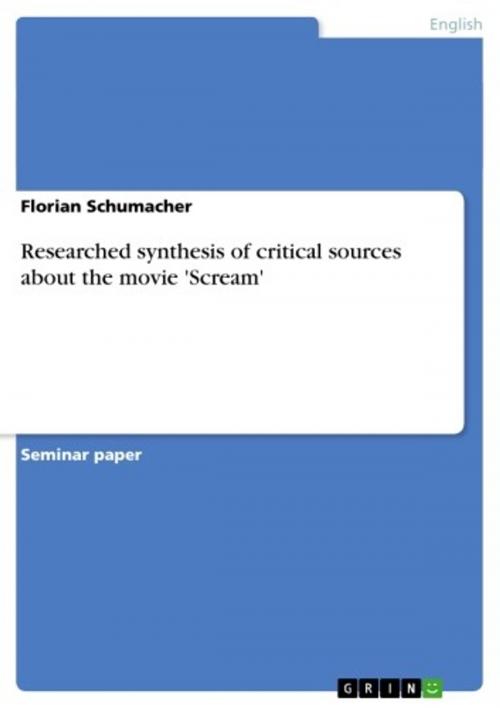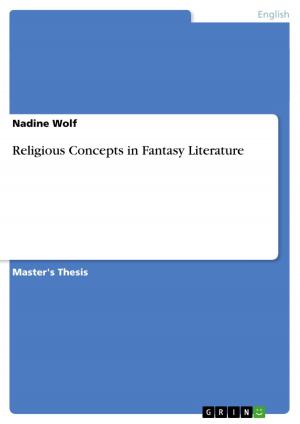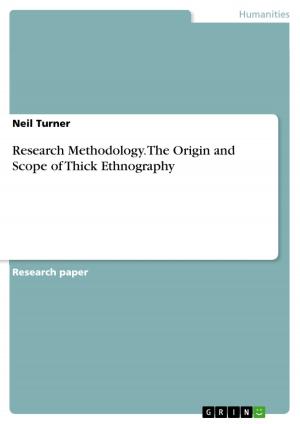Researched synthesis of critical sources about the movie 'Scream'
Nonfiction, Entertainment, Drama, Anthologies| Author: | Florian Schumacher | ISBN: | 9783640135714 |
| Publisher: | GRIN Publishing | Publication: | August 12, 2008 |
| Imprint: | GRIN Publishing | Language: | English |
| Author: | Florian Schumacher |
| ISBN: | 9783640135714 |
| Publisher: | GRIN Publishing |
| Publication: | August 12, 2008 |
| Imprint: | GRIN Publishing |
| Language: | English |
Seminar paper from the year 2004 in the subject American Studies - Literature, grade: 1,0, University of Wisconsin - La Crosse - USA (University of Wisconsin - La Crosse - USA, Anglistik), course: Films and Literature, 14 entries in the bibliography, language: English, abstract: In this research paper, I am going to analyze several critical sources that all deal with the movie Scream, directed by Wes Craven. This paper will show why Scream was a huge success and why it was totally different from any older slasher-movie. Even though this movie is scary and horrific, it is also a parody on older slasher-movies, it is extremely self-referential, and its characters are extremely knowledgeable about the horror-genre, which makes this movie funny and ironic and lets the audience experience a completely new kind of slasher-film. In the following, I will now summarize the critical articles that deal with Scream, after which I will discuss the relationships between these articles. The first source I analyzed was a chapter about the movie Scream in John Kenneth Muir's book Wes Craven - The Art of Horror. Muir starts this chapter with a quote from the Los Angeles Times, saying that Scream risks going way over the top, deliberately generating considerable laughter in the process, and that it ends up as terrific entertainment that also explores the relationship between movies and their audiences (from Kevin Thomas in The Los Angeles Times). Muir states that Scream is undeniably a horror masterpiece and that Craven achieved something extraordinary in a genre that is known neither for its intelligence nor for its wit. He thinks that Scream is exceptional because it is so intelligent, so witty, and most importantly scary. In Muir's opinion, Scream is the ultimate tale of America's VCR generation, which is extremely cynical and knows everything about the latest technologies (cell-phones, pagers, etc.). But it is also very referential, because the characters refer to movies or shows all the time, e.g. when two cheerleaders make up the theory that Sidney is the Woodsboro murderer - based on psychological arguments from 'The Ricky Lake Show.' Muir thinks that because of the intense exposure to television and movies, today's teens are not only callous and cynical, they are also unbelievably smart as part of a defence mechanism to understand the modern world with all its technology.
Seminar paper from the year 2004 in the subject American Studies - Literature, grade: 1,0, University of Wisconsin - La Crosse - USA (University of Wisconsin - La Crosse - USA, Anglistik), course: Films and Literature, 14 entries in the bibliography, language: English, abstract: In this research paper, I am going to analyze several critical sources that all deal with the movie Scream, directed by Wes Craven. This paper will show why Scream was a huge success and why it was totally different from any older slasher-movie. Even though this movie is scary and horrific, it is also a parody on older slasher-movies, it is extremely self-referential, and its characters are extremely knowledgeable about the horror-genre, which makes this movie funny and ironic and lets the audience experience a completely new kind of slasher-film. In the following, I will now summarize the critical articles that deal with Scream, after which I will discuss the relationships between these articles. The first source I analyzed was a chapter about the movie Scream in John Kenneth Muir's book Wes Craven - The Art of Horror. Muir starts this chapter with a quote from the Los Angeles Times, saying that Scream risks going way over the top, deliberately generating considerable laughter in the process, and that it ends up as terrific entertainment that also explores the relationship between movies and their audiences (from Kevin Thomas in The Los Angeles Times). Muir states that Scream is undeniably a horror masterpiece and that Craven achieved something extraordinary in a genre that is known neither for its intelligence nor for its wit. He thinks that Scream is exceptional because it is so intelligent, so witty, and most importantly scary. In Muir's opinion, Scream is the ultimate tale of America's VCR generation, which is extremely cynical and knows everything about the latest technologies (cell-phones, pagers, etc.). But it is also very referential, because the characters refer to movies or shows all the time, e.g. when two cheerleaders make up the theory that Sidney is the Woodsboro murderer - based on psychological arguments from 'The Ricky Lake Show.' Muir thinks that because of the intense exposure to television and movies, today's teens are not only callous and cynical, they are also unbelievably smart as part of a defence mechanism to understand the modern world with all its technology.















